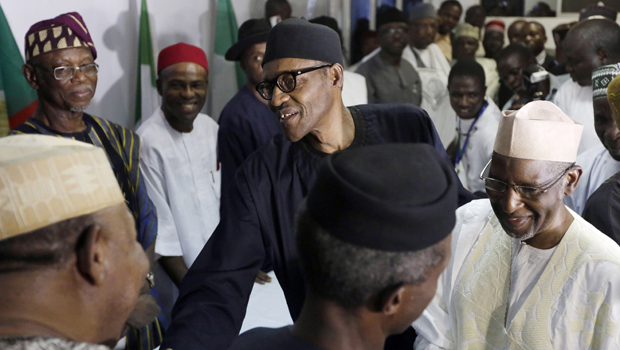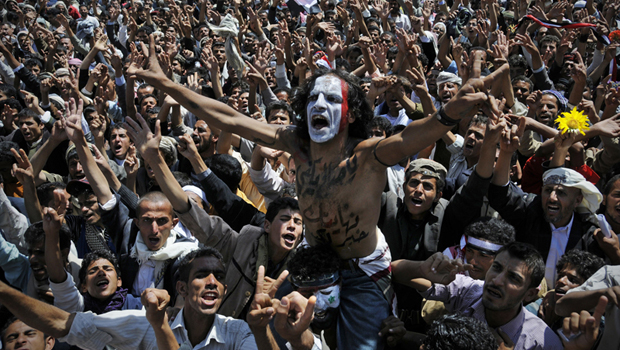#BabaNowThatYouAreThere – Nigeria tweets for power
 Nigeria’s President-elect Muhammadu Buhari following his historic election win. (PA)
Nigeria’s President-elect Muhammadu Buhari following his historic election win. (PA)
Nigerian voters made clear on Saturday that they are ready for change, and they have taken to Twitter to tell new leader Muhammadu Buhari exactly what those changes should be. Using the hashtag #BabaNowThatYouAreThere, calls for reliable power supply are dominating the feed.
Chronic gas shortages mean less than half of Nigeria’s 7.6 GW of installed generation capacity is currently producing power. To guarantee further gas supplies Buhari will need to amend the country’s long-delayed upstream regulation – and the prospects for this look bleak.
Although the president-elect’s reforming momentum may help ease the passage of the Petroleum Industry Bill, there will be no major new oil and gas reform until 2016 at the earliest, said Roderick Bruce, principal energy analyst for West Africa at IHS.
Legacy of debt
Nigeria’s energy sector requires billions of dollars in investment to improve its transmission and distribution networks and bring new gas supply and generation capacity online – most of which will need to be funded by the private sector. However, the mismanagement of the country’s privatisation process has left sponsors scarred.
Investors that bought into generation companies (gencos) in Nigeria’s November 2013 privatisation programme have still only received a trickle of the funds they expected for their power production, leaving some on the brink of bankruptcy.
This has had a knock-on effect on the country’s banking industry, which debt-financed around 70% of the total value of the transactions in the privatisation process and has limited appetite for new investment.
“Nigeria’s financial sector is strong, but there is only so much liquidity in it and they are unlikely in the current climate to take major risks on the power sector, [and this is] reflected in the difficulties preferred bidders are having in raising the necessary funds to buy the assets under the National Integrated Power Projects initiative,” said David Slater, senior project manager at Cross-border Information.
Outgoing President Goodluck Jonathan’s government made efforts to repay these power sector debts. In November 2014, the Central Bank of Nigeria (CBN) signed off on the creation of a NGN 213 billion ($1.07 billion) federal government intervention fund intended to offset all legacy debts accrued to gencos and gas suppliers. The government wrote off a further $230 million in debt owed by generators to upstream gas suppliers.
The stabilisation fund was a prelude to the launch of the Transitional stage of the Electricity Market (TEM) on 1 February this year, when power-purchase agreements (PPAs) were made fully effective. The Nigerian Electricity Regulatory Commission had intended to activate the PPAs when power assets were handed over in 2013. However, once the extent of the distribution network losses and illiquidity at the distribution companies was apparent, they were forced to delay the process.
Too little, too late
The CBN intervention fund is “too little, too late”, said one investor, whose company holds a 15% stake in a 200 MW gas-fired power plant and 25% in a 600 MW hydro plant. In the 16 months since the power stations were handed over to the company, the combined payments the group has received for power production has not even covered a quarter of the bills.
“Even this disbursement is a joke – there is no disbursement, they have disbursed peanuts,” said the investor, adding the energy ministry had promised the company NGN 12 billion from the intervention fund within two weeks. “That was two months ago and how much did we collect? NGN 1 billion, not even a fraction of one month’s invoice,” the investor added.
If further funds are not disbursed, the investor warned there was “a high probability” the company would go to international arbitration to recoup the NGN 20 billion payment backlog.
However, if the new government is able to honour the new PPA contracts from this month onwards, “they will at least avoid a systemic collapse [of the power market] because we can still survive even if the lack of revenue means that we have not repaid a dime from our debt facilities”, the investor said.
But in reality, ensuring payment for the PPAs will require addressing all other areas of the electricity market in tandem.
“If you're looking at the market from a regulatory perspective, the TEM is in effect. There are, however, quite a few major technical and operational conditions that suggest otherwise. For example, the TEM operation requires all back payments to be made are made, gas contracts to be effective and LCs put in place for all GENCOs. But the government hasn’t managed to resolves these issues so, from the market’s perspective, there is nothing to say that the TEM is operational even if it has been declared,” said John Ukpaka, from the Energy and Project Finance Department of Lagos-based Adepetun Caxton-Martins Agbor & Segun.
This story was updated on Thursday 2 April at 2:30pm to clarify the name of the lawyer at the Lagos-based firm.








